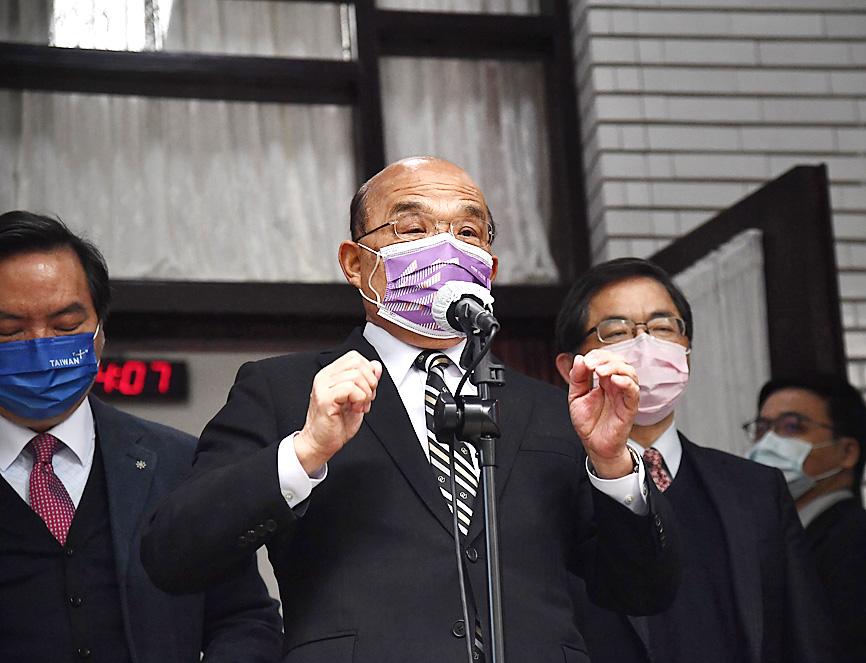Russia’s decision to put Taiwan on a list of foreign countries deemed “unfriendly” to Moscow since its invasion of Ukraine would for now have little effect on bilateral relations, Minister of Foreign Affairs Joseph Wu (吳釗燮) said yesterday.
Taiwan’s representative office in Moscow is operating normally and is carrying out its mission, including assisting Taiwanese evacuated from Ukraine, without Russian interference, Wu said.
However, the Ministry of Foreign Affairs would closely monitor the situation so that it is prepared to respond accordingly if Russia takes any action against Taiwan, he added.

Photo: CNA
Wu’s comments were made after the Russian government on Monday released a list of 48 countries and territories deemed unfriendly to Moscow because they had imposed or joined international sanctions against Russia over its invasion of Ukraine.
Taiwan is on the list along with Albania, Andorra, Australia Canada, Iceland, Japan, Liechtenstein, Monaco, Montenegro, New Zealand, North Macedonia, Norway, San Marino, Singapore, South Korea, Switzerland, Ukraine, the UK and the US, as well as EU member states and Micronesia, Russian state news agency TASS reported.
TASS mentioned Taiwan as being “considered a territory of China, but ruled by its own administration since 1949,” as Moscow has diplomatic ties with Beijing.
Russia is allowing all of its public entities, its citizens and local enterprises to pay back debts to any creditors in the listed countries and territories in rubles, which has plunged to all-time lows since the sanctions were imposed, TASS reported.
Wu told a session of the Legislative Yuan yesterday that investment and trade between Taiwan and Russia are “not very significant,” so being included on the list is not expected to have a major impact on Taiwan.
Government data for last year showed that bilateral trade between Taiwan and Russia reached US$6.31 billion, with exports to Russia totaling US$1.32 billion and accounting for 0.76 percent of total outbound sales.
According to the Ministry of Economic Affairs, Taiwan mainly exports to Russia machine parts, discs, auto parts, audio and visual signal equipment, polycarbonate resin and stainless steel flat-rolled products, while mainly importing raw materials, early-stage processed products — such as coal, petroleum, aluminum and iron — and non-alloy steel semi-finished products.
In 2019, Russia became Taiwan’s ninth-largest machine tool export market, with exported machine tools totaling US$107.95 million.
Meanwhile, total trade volume with Ukraine in the first 11 months of last year totaled US$280.75 million and accounted for 0.037 percent of Taiwan’s total trade volume.
Democratic Progressive Party (DPP) Legislator Lo Chih-cheng (羅致政), who doubles as the DPP’s head of international affairs, told reporters that Taiwan did not need to worry too much about being on Russia’s list of unfriendly countries.
Taiwan is joining many countries worldwide in showing solidarity with Ukraine and has the “moral high ground,” Lo said.
Taiwan has announced that it intends to join the US and other countries in imposing sanctions against Russia over its invasion of Ukraine, but it has yet to provide further details.
The nation also launched a fundraising campaign that has so far raised more than NT$400 million (US$14.11 million) in less than a week and donated supplies to Ukraine.

SECURITY: As China is ‘reshaping’ Hong Kong’s population, Taiwan must raise the eligibility threshold for applications from Hong Kongers, Chiu Chui-cheng said When Hong Kong and Macau citizens apply for residency in Taiwan, it would be under a new category that includes a “national security observation period,” Mainland Affairs Council (MAC) Minister Chiu Chui-cheng (邱垂正) said yesterday. President William Lai (賴清德) on March 13 announced 17 strategies to counter China’s aggression toward Taiwan, including incorporating national security considerations into the review process for residency applications from Hong Kong and Macau citizens. The situation in Hong Kong is constantly changing, Chiu said to media yesterday on the sidelines of the Taipei Technology Run hosted by the Taipei Neihu Technology Park Development Association. With

CARROT AND STICK: While unrelenting in its military threats, China attracted nearly 40,000 Taiwanese to over 400 business events last year Nearly 40,000 Taiwanese last year joined industry events in China, such as conferences and trade fairs, supported by the Chinese government, a study showed yesterday, as Beijing ramps up a charm offensive toward Taipei alongside military pressure. China has long taken a carrot-and-stick approach to Taiwan, threatening it with the prospect of military action while reaching out to those it believes are amenable to Beijing’s point of view. Taiwanese security officials are wary of what they see as Beijing’s influence campaigns to sway public opinion after Taipei and Beijing gradually resumed travel links halted by the COVID-19 pandemic, but the scale of

A US Marine Corps regiment equipped with Naval Strike Missiles (NSM) is set to participate in the upcoming Balikatan 25 exercise in the Luzon Strait, marking the system’s first-ever deployment in the Philippines. US and Philippine officials have separately confirmed that the Navy Marine Expeditionary Ship Interdiction System (NMESIS) — the mobile launch platform for the Naval Strike Missile — would take part in the joint exercise. The missiles are being deployed to “a strategic first island chain chokepoint” in the waters between Taiwan proper and the Philippines, US-based Naval News reported. “The Luzon Strait and Bashi Channel represent a critical access

Pope Francis is be laid to rest on Saturday after lying in state for three days in St Peter’s Basilica, where the faithful are expected to flock to pay their respects to history’s first Latin American pontiff. The cardinals met yesterday in the Vatican’s synod hall to chart the next steps before a conclave begins to choose Francis’ successor, as condolences poured in from around the world. According to current norms, the conclave must begin between May 5 and 10. The cardinals set the funeral for Saturday at 10am in St Peter’s Square, to be celebrated by the dean of the College